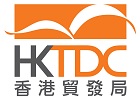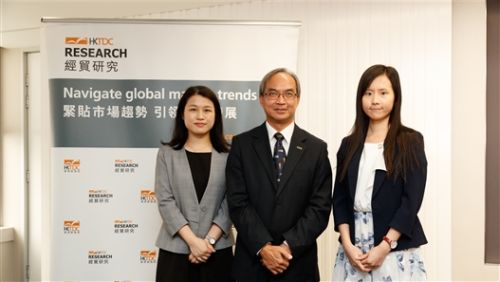Sep 23, 2019 19:00 JST
 Source: HKTDC
Source: HKTDC
|
|
|
HKTDC Export Index 3Q19: HK exports expected to show negative growth in 2019
- Capturing manufacturing opportunities in Cambodia, Myanmar
HONG KONG, Sep 23, 2019 - (ACN Newswire) - As the trade dispute between the United States and Mainland China continues and the world economy beings to slow, the Hong Kong Trade Development Council (HKTDC) has made a further downward revision to its forecast for Hong Kong's export performance in 2019, saying the city's exports will decline 4% by value this year.
 | | Announcing a revised export growth forecast for 2019 and the Hong Kong Trade Development Council (HKTDC) Export Index for the third quarter of 2019 are: HKTDC Assistant Principal Economist (Greater China) Alice Tsang, HKTDC Director of Research Nicholas Kwan and HKTDC Economist Jacqueline Yuen (from L). |
Speaking at a press conference today, HKTDC Director of Research Nicholas Kwan said the United States has imposed tariffs on almost all goods imported from the mainland. "Inevitably, this will have an impact on Hong Kong's exports to the US. Local traders should look to capture opportunities among the challenges and hasten their pace of expansion into emerging economies such as Association of Southeast Asian Nations (ASEAN) countries, Latin America and the Middle East. Hong Kong's exports to these markets are growing steadily, with ASEAN recently surpassing the US as the city's second-largest export market." In the first seven months of 2019, the city's exports to ASEAN markets climbed 4.6% year-on-year while those to the US fell 10.9%.
Under the current restructuring of the global supply chain, Mr Kwan added that Hong Kong manufacturers can consider setting up new production bases in countries along the Belt and Road. "In addition to cooperating with industrial parks in these countries, they can also explore expanding their businesses in the respective markets," he said.
More orders cancelled or reduced
According to the HKTDC's latest study, more than half of the local exporters surveyed have been negatively affected by the current trade friction, with shrinking order sizes (73.4%), price bargaining (44.1%), cancelled orders (26.6%) the most common consequences. A total of 27.7% of respondents said they need to share additional tariff costs with buyers.
Hong Kong traders have adopted different strategies to cope with these business challenges. In addition to "develop in non-US market" (45.3%), manufacturers have "lowered unit prices" (23.9%), "moved production/sourcing bases" (23.4%), "downsized the company" (19.9%) and "lowered the minimum order quantity (MOQ)" (14.9%).
"It is worth noting that the reduction or cancellation of orders and price reductions is more serious than before. Among Hong Kong companies surveyed that have relocated their production or sourcing bases, 32.7% of them have shifted activity to Vietnam, 16.4% to Cambodia and 10.9% to India. This will impact Hong Kong companies that provide trade-related services," Mr Kwan said.
He added that Hong Kong traders are known for their flexibility and are willing to reduce the MOQ in response to new sourcing trends. Combining trade fairs with online promotion, the hktdc.com Small Order service enables the instant transaction of goods with orders between five and 1,000 pieces. This helps Hong Kong traders to connect with new buyers and expand into fresh markets beginning with small orders.
Export Index plunges to 27.4, close to historic low
HKTDC Assistant Principal Economist (Greater China) Alice Tsang said the HKTDC Export Index fell 9.9 points to 27.4 in the third quarter of 2019, close to the historic low experienced during the financial turmoil in 2008. "The indices of various industries and markets have fallen across the board, reflecting that Hong Kong exporters are generally bearish on export prospects," she said.
With more than 70% of exporters anticipating a drop in their total sales in 2019, Ms Tsang said that the Sino-US trade tensions (33.2%), softening global demand (30.4%) and currency fluctuations (9.8%) will be the biggest challenges affecting Hong Kong exporters in the coming months. By comparison, the impact of Brexit will be minimal (2.6%). "Hong Kong exporters are becoming more pessimistic on the outcome of Sino-US trade war, with 61% of them expecting it will have negative impact on their businesses," added Ms Tsang.
The HKTDC Export Index reflects the prospects of the city's near-term export performance. Readings above and below 50 indicate an optimistic or pessimistic outlook respectively. The business confidence survey is conducted on a quarterly basis, interviewing 500 local traders from six major industry sectors including electronics, jewellery, timepieces, toys, garments and machinery.
Manufacturing in Myanmar and Cambodia
The ongoing trade dispute between the mainland and the US has pushed more Hong Kong traders to diversify their manufacturing and sourcing activities to other countries. HKTDC Economist Jacqueline Yuen has assessed the advantages of Cambodia and Myanmar as production bases in the region. Hong Kong businesses should carefully consider various factors before making an investment decision, she advised.
Ms Yuen said Cambodia is a pragmatic choice for Hong Kong businesses to set up factories, as the government welcomes overseas investment and provides preferential and tax relief measures for foreign investors. There is also no restriction on profit and capital remittance. She said Cambodia's garment and textile industry is booming, and now accounts for more than 70% of the country's total exports. To enable more diversified industrial development in the country, the government has set up more than 40 Special Economic Zones (SEZs). "These SEZs are generally equipped with better infrastructure and administrative support. Companies in the region are also eligible for import VAT exemptions and simplified customs procedures. In addition, Cambodia is connected to Laos, Thailand and Vietnam, making it easy for Hong Kong companies to export goods to these fast-growing consumer markets."
Risk assessment is essential
Ms Yuen advised Hong Kong companies to pay attention to rising wages and the risk of suspension of preferential export access to the European Union (EU) when looking to invest in ASEAN countries. "The average monthly salary of manufacturing workers has risen above US$240 in Cambodia, and the minimum wage is now higher than that of Vietnam. Besides, under the Generalized System of Preferences scheme (GSP), Cambodia currently enjoys duty-free exports to major developed regions such as the US and EU. Once the EU beneficiary status is lost, the import duty on clothing and footwear could reach up to 17%."
With a labour force of 24.6 million, Myanmar offers a good supply of low-cost workers, making it an attractive choice for labour-intensive manufacturing. She said wage levels in Myanmar were competitive in the region, with the average monthly salary of a manufacturing worker standing at about US$160. "However, Myanmar limits the work per week to 44 hours, while overtime is capped at four hours and any overtime work must be approved in advance by the Factories and General Labour Laws Inspection Department," Ms Yuen explained. Another issue to consider is the country's unstable electricity supply, with an average of 21 outages per year, each lasting for about an hour. "Back-up generators may be an option for Hong Kong manufacturers," she added.
Under the Myanmar Investment Law, foreign investors going into less-developed regions in the country enjoy lengthier income-tax relief. She advised, however, that factories should not be located too far away from townships, as workers generally prefer a shorter commute. Otherwise, a transport allowance or shuttle bus service may be needed to attract workers.
References
- HKTDC Research website: http://research.hktdc.com/
- 2019 Export Forecast Review: Heightened Trade Tensions and Deteriorating Operating Environment Will See Hong Kong Exports Drop 4% in 2019 https://bit.ly/2kmKrXn
- HKTDC Export Index 3Q19: Hong Kong Exports Struggle as China-US Trade Tensions Escalate https://bit.ly/2kpIl9l
- Practical Tips for Manufacturing in Myanmar https://bit.ly/2m6tMrx
- Practical Tips for Manufacturing in Cambodia https://bit.ly/2kGB98Q
- Photo download: https://bit.ly/2kv0m61
Contact:Beatrice Lam, Tel: +852 2584 4049, Email: beatrice.hy.lam@hktdc.org
Source: HKTDC
Sectors: Daily Finance, Daily News, Funds & Equities, Local Biz
Copyright ©2024 ACN Newswire. All rights reserved. A division of Asia Corporate News Network. |
Latest Release

Mitsubishi Heavy Industries and NGK to Jointly Develop Hydrogen Purification System from Ammonia Cracking Gas
Apr 18, 2024 17:01 JST
| 
Toyota Launches All-New Land Cruiser "250" Series in Japan
Apr 18, 2024 13:39 JST
| 
Fujitsu and Oracle collaborate to deliver sovereign cloud and AI capabilities in Japan
Apr 18, 2024 11:14 JST
| 
Eisai: Research on Treatments for Alzheimer's Disease Based on Its Pathological Mechanisms Recieves Award for Science and Technology (Research Category)
Apr 18, 2024 10:53 JST
| 
All-New Triton Confirmed as First Double-Cab Pickup Truck to Achieve 2024 Five-Star ANCAP Safety Rating
Apr 18, 2024 09:22 JST
| 
Eisai's Antiepileptic Drug Fycompa Injection Formulation Launched In Japan
Apr 17, 2024 16:17 JST
| 
Honda Unveils Next-generation EV Series for China
Apr 17, 2024 12:15 JST
| 
Lexus presents Time at the 2024 Milan Design Week
Apr 16, 2024 18:49 JST
| 
Mitsubishi Corporation Announces Participation in a DAC Project in Louisiana, USA
Apr 16, 2024 14:36 JST
| 
New circuit challenge for TOYOTA GAZOO Racing
Apr 15, 2024 17:21 JST
| 
TOYOTA GAZOO Racing back on asphalt for Croatian challenge
Apr 12, 2024 19:36 JST
| 
Heidelberg Materials North America Announces Latest Milestone in Edmonton CCUS Project
Apr 12, 2024 14:39 JST
| 
MHIAEL Completes Expansion of the its Nagasaki Plant for Manufacture of Aero Engine Combustors
Apr 11, 2024 18:08 JST
| 
Mitsubishi Shipbuilding Acquires Approval in Principle (AiP) from Classification Society ClassNK for Ammonia Fuel Supply System (AFSS)
Apr 11, 2024 17:50 JST
| 
DOCOMO, NTT, NEC and Fujitsu Develop Top-level Sub-terahertz 6G Device Capable of Ultra-high-speed 100 Gbps Transmission
Apr 11, 2024 15:10 JST
| 
Mitsubishi Corporation Announces Completion of Capital Raise by Nexamp
Apr 11, 2024 13:07 JST
| 
Mitsubishi Shipbuilding Receives Order for Ammonia Fuel Supply System for Ammonia-Powered Marine Engine
Apr 10, 2024 16:55 JST
| 
Transgene and NEC Present First Clinical Benefits of Neoantigen Cancer Vaccine, TG4050, in Head & Neck Cancer at AACR 2024
Apr 10, 2024 13:36 JST
| 
DENSO, Companies Initiate Demonstration to Expand Automotive Recycling Process
Apr 09, 2024 19:07 JST
| 
Mitsubishi Power Receives Order from HK Electric for Natural-gas-fired GTCC Power Generation Equipment
Apr 09, 2024 15:04 JST
|
More Latest Release >>
|